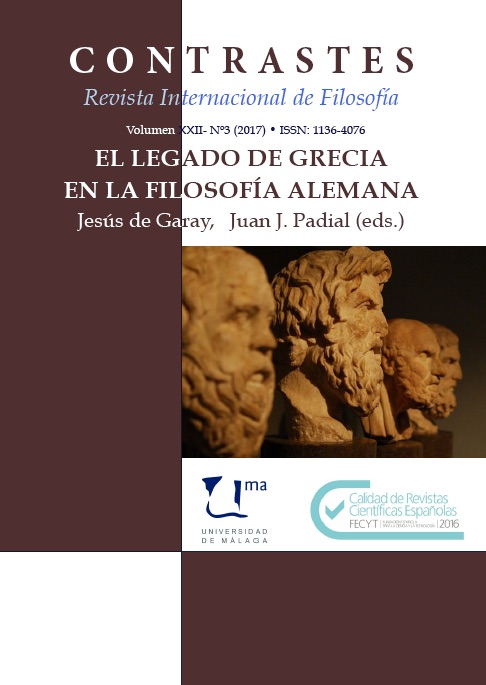Impact of the image of Greeceon the early work of Hölderlin.
DOI:
https://doi.org/10.24310/Contrastescontrastes.v22i3.3760Keywords:
GERMAN IDEALISM, HÖLDERLIN, GREECE, PLATONISM, HEGELAbstract
In Hölderlin’s thinking, Greece works as an untimely paradigm that allows him to articulate the critique of the present, rather than as a historical reference, which would elicit the elegiac lament and the nostalgia of the past. And this singular understanding of the relation between Greece and modernity, wich is at odds with the conventional model of the philosophy of history, fertilizes his search for a new ontology—one that would be able to surpass the kantian limits, following suggestions by Schiller or Fichte while, at the same time, pointing out their insufficiencies. In this respect, it is decisive to properly understand the reception of a Neoplatonic reading of Plato in the context of the philosophy of Unification.
Downloads
Metrics
Publication Facts
Reviewer profiles N/A
Author statements
Indexed in
-
—
- Academic society
- N/A
- Publisher
- Universidad de Málaga
Downloads
Published
How to Cite
Issue
Section
License
This journal provides immediate free access to its content under the principle of making research freely available to the public. All content published in Contrastes. Revista Internacional de Filosofía, are subject to the Creative Commons Attribution-NonCommercial-ShareAlike 4.0 license whose full text can be found at <http://creativecommons.org/licenses/by-nc-sa/4.0>
It is the responsibility of the authors to obtain the necessary permissions of the images that are subject to copyright.
Authors whose contributions are accepted for publication in this journal will retain the non-exclusive right to use their contributions for academic, research and educational purposes, including self-archiving or repository in open access repositories of any kind.
The electronic edition of this magazine is edited by the Editorial Service of the University of Malaga (Uma Editorial), being necessary to cite the origin in any partial or total reproduction.










5.png)
